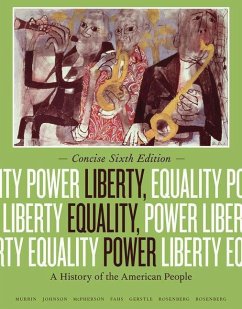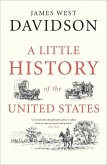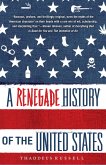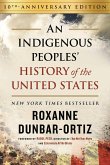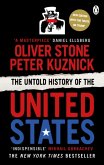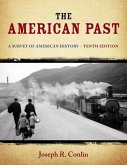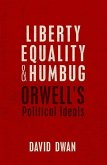Emily Rosenberg (Irvine University of California), Norman Rosenberg (Macalester College), John Murrin (Emeritus Princeton University)
Liberty, Equality, Power: A History of the American People
Mitwirkender: Murrin, John M.; McPherson, James M.; Johnson, Paul E.
72,99 €
inkl. MwSt.
Versandkostenfrei*
Liefertermin unbestimmt
Melden Sie sich
hier
hier
für den Produktalarm an, um über die Verfügbarkeit des Produkts informiert zu werden.

36 °P sammeln
Emily Rosenberg (Irvine University of California), Norman Rosenberg (Macalester College), John Murrin (Emeritus Princeton University)
Liberty, Equality, Power: A History of the American People
Mitwirkender: Murrin, John M.; McPherson, James M.; Johnson, Paul E.
- Broschiertes Buch
How did America transform itself, in a relatively short time, from a land inhabited by hunter-gatherer and agricultural Native American societies into the most powerful industrial nation on earth? You'll find out in LIBERTY, EQUALITY, POWER: A HISTORY OF THE AMERICAN PEOPLE, CONCISE Sixth Edition. The authors tell this story through the lens of three major themes: liberty, equality, and power. You'll learn not only the impact of the notions of liberty and equality but also how dominant and subordinate groups have affected and been affected by the ever-shifting balance of power.
Andere Kunden interessierten sich auch für
![A Little History of the United States A Little History of the United States]() James West DavidsonA Little History of the United States13,99 €
James West DavidsonA Little History of the United States13,99 €![A Renegade History of the United States A Renegade History of the United States]() Thaddeus RussellA Renegade History of the United States17,99 €
Thaddeus RussellA Renegade History of the United States17,99 €![An Indigenous Peoples' History of the United States An Indigenous Peoples' History of the United States]() Roxanne Dunbar-OrtizAn Indigenous Peoples' History of the United States30,99 €
Roxanne Dunbar-OrtizAn Indigenous Peoples' History of the United States30,99 €![The Untold History of the United States The Untold History of the United States]() Oliver StoneThe Untold History of the United States15,99 €
Oliver StoneThe Untold History of the United States15,99 €![The American Past: A Survey of American History The American Past: A Survey of American History]() Joseph Conlin (Chico Formerly at California State University)The American Past: A Survey of American History207,99 €
Joseph Conlin (Chico Formerly at California State University)The American Past: A Survey of American History207,99 €![Saving Freedom Saving Freedom]() Joe ScarboroughSaving Freedom15,99 €
Joe ScarboroughSaving Freedom15,99 €![Liberty, Equality, and Humbug Liberty, Equality, and Humbug]() David Dwan (Associate Professor, Hertford College, University of OxLiberty, Equality, and Humbug26,99 €
David Dwan (Associate Professor, Hertford College, University of OxLiberty, Equality, and Humbug26,99 €-
-
-
How did America transform itself, in a relatively short time, from a land inhabited by hunter-gatherer and agricultural Native American societies into the most powerful industrial nation on earth? You'll find out in LIBERTY, EQUALITY, POWER: A HISTORY OF THE AMERICAN PEOPLE, CONCISE Sixth Edition. The authors tell this story through the lens of three major themes: liberty, equality, and power. You'll learn not only the impact of the notions of liberty and equality but also how dominant and subordinate groups have affected and been affected by the ever-shifting balance of power.
Produktdetails
- Produktdetails
- Verlag: Cengage Learning EMEA / Wadsworth
- Concise 6th ed.
- Seitenzahl: 896
- Erscheinungstermin: 1. Januar 2013
- Englisch
- Abmessung: 274mm x 213mm x 33mm
- Gewicht: 1750g
- ISBN-13: 9781133947622
- ISBN-10: 113394762X
- Artikelnr.: 36334210
- Verlag: Cengage Learning EMEA / Wadsworth
- Concise 6th ed.
- Seitenzahl: 896
- Erscheinungstermin: 1. Januar 2013
- Englisch
- Abmessung: 274mm x 213mm x 33mm
- Gewicht: 1750g
- ISBN-13: 9781133947622
- ISBN-10: 113394762X
- Artikelnr.: 36334210
John M. Murrin studies American colonial and revolutionary history and the early republic. He has edited one multivolume series and five books, including two essay collections--COLONIAL AMERICA: ESSAYS IN POLITICS AND SOCIAL DEVELOPMENT, 6th Edition (2010) and SAINTS AND REVOLUTIONARIES: ESSAYS IN EARLY AMERICAN HISTORY (1984). His own essays cover topics ranging from ethnic tensions, the early history of trial by jury, the emergence of the legal profession, the Salem witch trials, the political culture of the colonies and the new nation as well as the rise of professional baseball and college football in the nineteenth century. He served as president of the Society for Historians of the Early American Republic in 1998 - 1999.
1. When Old Worlds Collide: Contact, Conquest, Catastrophe. 2. The Challenge to Spain and the Settlement of North America. 3. England Discovers Its Colonies: Empire, Liberty, and Expansion. 4. Provincial America and the Struggle for a Continent. 5. Reform, Resistance, Revolution. 6. The Revolutionary Republic. 7. Completing the Revolution, 1789-1815. 8. Northern Transformations, 1790-1850. 9. The Old South, 1790-1850. 10. Toward an American Culture. 11. Whigs and Democrats. 12. Antebellum Reform. 13. Manifest Destiny: An Empire for Liberty--or Slavery? 14. The Gathering Tempest, 1853-1860. 15. Secession and Civil War, 1860-1862. 16. A New Birth of Freedom, 1862-1865. 17. Reconstruction, 1863-1877. 18. A Transformed Nation: The West and the New South, 1865-1900. 19. The Rise of Corporate America, 1865-1914. 20. Cities, Peoples, Cultures, 1890-1920. 21. Progressivism. 22. Becoming a World Power, 1898-1917. 23. War and Society, 1914-1920. 24. The 1920s. 25. The Great Depression and the New Deal, 1929-1939. 26. America during the Second World War. 27. The Age of Containment, 1946-1953. 28. Affluence and Its Discontents, 1953-1963. 29. America during Its Longest War, 1963-1974. 30. Uncertain Times, 1974-1992. 31. Economic, Social, and Cultural Change in the Late 20th Century. 32. A Time of Hope and Fear, 1993-2012.
1. When Old Worlds Collide: Contact, Conquest, Catastrophe. 2. The Challenge to Spain and the Settlement of North America. 3. England Discovers Its Colonies: Empire, Liberty, and Expansion. 4. Provincial America and the Struggle for a Continent. 5. Reform, Resistance, Revolution. 6. The Revolutionary Republic. 7. Completing the Revolution, 1789-1815. 8. Northern Transformations, 1790-1850. 9. The Old South, 1790-1850. 10. Toward an American Culture. 11. Whigs and Democrats. 12. Antebellum Reform. 13. Manifest Destiny: An Empire for Liberty--or Slavery? 14. The Gathering Tempest, 1853-1860. 15. Secession and Civil War, 1860-1862. 16. A New Birth of Freedom, 1862-1865. 17. Reconstruction, 1863-1877. 18. A Transformed Nation: The West and the New South, 1865-1900. 19. The Rise of Corporate America, 1865-1914. 20. Cities, Peoples, Cultures, 1890-1920. 21. Progressivism. 22. Becoming a World Power, 1898-1917. 23. War and Society, 1914-1920. 24. The 1920s. 25. The Great Depression and the New Deal, 1929-1939. 26. America during the Second World War. 27. The Age of Containment, 1946-1953. 28. Affluence and Its Discontents, 1953-1963. 29. America during Its Longest War, 1963-1974. 30. Uncertain Times, 1974-1992. 31. Economic, Social, and Cultural Change in the Late 20th Century. 32. A Time of Hope and Fear, 1993-2012.
